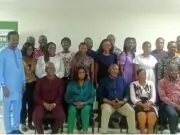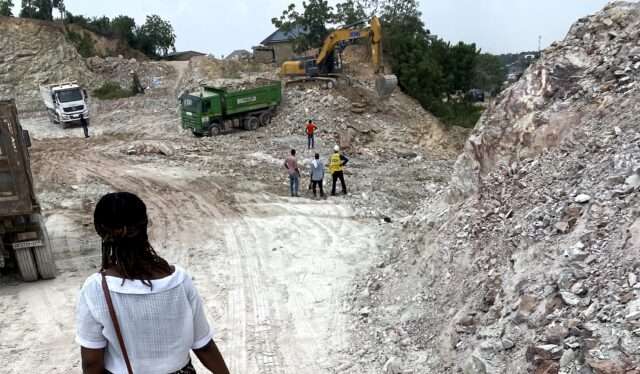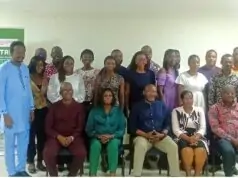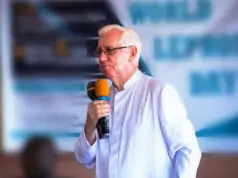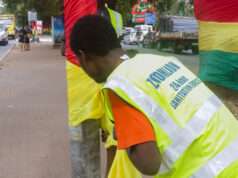Vroom, vroom, vroom—the excavator’s engine roared, shaking the ground below. The vibrations ran through Kofi Agyekum’s (not his real name) rough hands, toughened by years of hard work. With steady focus, he operated the machine, scooping gravel and dust from the ground. This daily activity occurs at the Omanjor Quarry site, located behind the Mensah Addo Memorial School in the Ga Central Municipality of the Greater Accra region.
Before him, a sea of tipper trucks stretched out, 13 waiting patiently in line, their drivers watching with a mixture of anticipation and boredom. Kofi’s focus, however, was on the tipper truck directly in front of him. He loaded the construction mineral (gravel) into the truck with precision, and the truck’s bed filled up slowly with the valuable cargo.
As he worked, Kofi’s bosses, Robert Kwasi Agyapong and Joseph Kotey Eyison, watched over the operation, their voices carrying on the wind as they issued instructions. Joseph Kotey Eyison clutched a small book in his arm, where he meticulously recorded the number of trucks loaded each day.
During an interview, Robert Kwasi Agyapong said, “This quarry is registered as Nii Oman Mensah Quarry Company with the Minerals Commission. For two decades, we have operated as a firm, and we have a permit to work. We have paid all royalties to them. Occasionally, the Minerals Commission and the Environmental Protection Agency (EPA) conduct inspections. Additionally, personnel from the Ghana Police Service (Accra Central) visit to collect ‘chop money.’ Whenever the assembly visits, it’s not to collect revenue but to purchase gravel.”
Joseph Kotey Eyison interjected, saying, “The Chinese have slowed down the business. Now, they extract granites, and people prefer that to ours. We sell a fully loaded tipper truck for GH¢500, and on a good day, we can load 50 tipper trucks.”
Local quarries losing ground
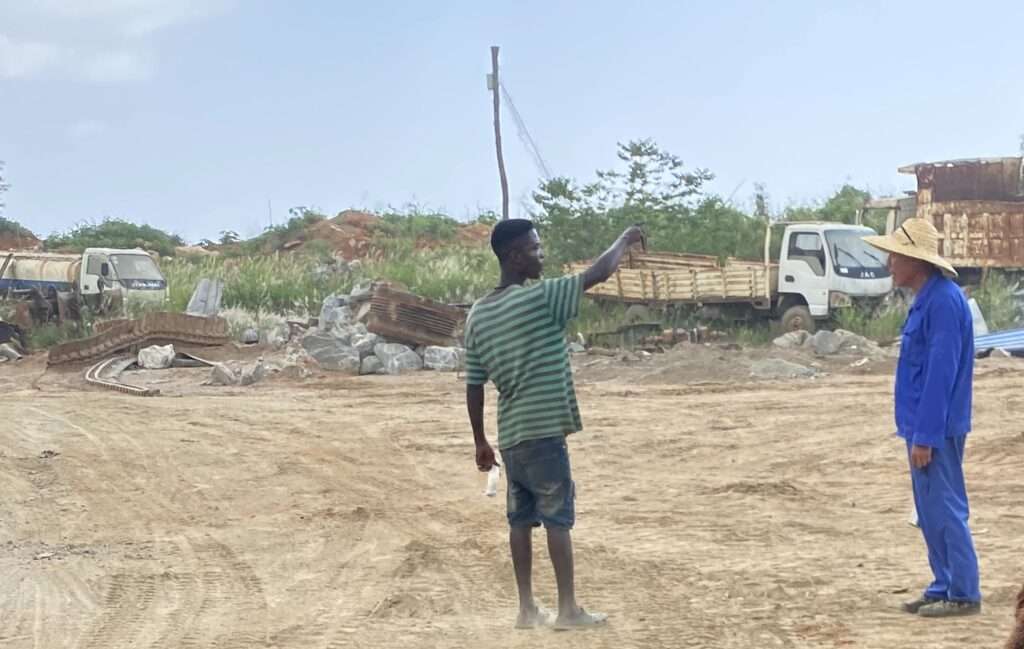
During the visit, not a single driver requested a receipt. Michael Lebene, a tipper truck driver, said, “I don’t need a receipt because I buy from them and sell to others. My selling price ranges from GH¢1,500 to 2,000, depending on the location.”
As Accra’s vibrant chaos fades into the distance, a hidden world awakens. In the Central Region’s emerald hills lies a Ghanaian-owned gem: Nsokot Quarry. Born from the union of two names, Nso-Djan and Koton, this Bentum-based company has been the lifeblood of the Awutu Senya district for nearly a decade. For years, the thunder of heavy equipment has echoed across the terrain, quarrying granite and processing it into vital aggregates for construction.
The Quarry Manager, Felix Martey Anderson, sits in his office, which is adorned with certificates and licenses. According to him, “A cubic meter of aggregates is sold within the range of GH¢150-180, depending on the quantity required”.
“Additionally, you can’t operate a quarry illegally. Before you can operate, it requires a lot: you need explosives to blast the mountain, which you can’t acquire illegally. If you acquire explosives illegally and blast, it will cause vibrations that can damage people’s houses. If you’re reported, the Minerals Commission will take action, imposing a fine of $50,000 or a penalty of up to five years’ imprisonment.”
Commenting on the payment of royalties, Mr. Anderson said, “Those things are actually mandatory and statutory. I don’t see them as problems. The royalties are tied to our sales. We pay Value Added Tax (VAT), and our sales are electronically monitored. The system is similar to a Point of Sale (POS), using electronic vouchers.”
“The Minerals Income Investment Fund (MIIF) and the Ghana Revenue Authority (GRA) also monitor our sales. They can track everything from their office, and when they visit, we simply print out the records. It’s all connected—whatever we do is reflected in the system. Although they can monitor remotely, they usually come to check in person.”
The rise of the foreign quarry kings
Since 2007, Maso Quarry has been a steadfast company in the Nsawam-Adoagyiri Municipality. For Bonaventure Appiah, the office clerk, it’s more than just a job. “We’re committed to giving back; we pay 5% of our production revenue as a royalty to the Minerals Commission every two months.”
Mr. Appiah’s expression turned somber as he voiced his concern about the rapid issuance of permits to Chinese companies, allowing them to extract stone and other materials from Ghana’s quarries at an alarming rate.
“It’s the Chinese who are collapsing the business. The ironic thing is that these Chinese companies employ locals and pay them every fortnight. Meanwhile, they fail to pay the necessary taxes. The Electricity Company of Ghana (ECG), GRA, and Social Security and National Insurance Trust (SSNIT) should disclose whether Chinese-owned companies are paying their taxes on time. You’ll find that they’re not paying, and instead, they’re making illegal connections. They get arrested, but somehow, they’re back in operation after just three days.”
Millions lost in plain sight
In 2021, the Africa Centre for Energy Policy (ACEP) conducted a research on Ghana’s quarry sector, focusing on “Estimating the revenue potential of the quarry subsector in Ghana.” The study sampled 15 quarry companies across five regions in Ghana and revealed a significant disparity: the 15 quarry companies had a revenue potential exceeding GH¢109 million, whereas the government’s annual royalty from these companies was a mere GH¢7 million.
Policy Lead for Minerals and Mining Policy at ACEP, Eliasu Ali, stated, “There is absolutely no monitoring and accountability in the quarry sector. The reason for this is that companies are required to self-report their production volumes to regulators. Unfortunately, the Minerals Commission does not independently verify the amounts companies are supposed to pay as royalties. Instead, they base their collection solely on the production volumes reported by the companies.”
“After completing the research, we engaged stakeholders and recommended implementing volumetric scanners at the entrance of quarry companies. This system would ensure that concessions are linked to the quarry company, allowing for an initial count of each truck’s load upon entry, which is automatically recorded. No manual management is required.”
“The system also tracks the volume of material in each truck’s bucket. Upon exit, another count is taken. The data is then transmitted via radio to a digital repository, enabling regulators to monitor activities on the site in real-time from their office. Disappointingly, the proposal received no consideration.”
Technology that could change everything
Between 2022 and October 2024, the Minerals Income Investment Fund (MIIF) generated significant quarry royalties, totaling GH¢6.4 million in 2022, GH¢13.6 million in 2023, and GH¢13.9 million in 2024, from its portfolio of over 120 registered quarries. Despite this substantial revenue, MIIF incurred a notable loss in 2022, exposing a startling reality: Ghana’s quarry sector was leaking over GH¢50 million annually in uncollected royalties. What key factors are driving these considerable losses?
A Business Development officer overseeing the quarry sector at MIIF, Charles Odoi Anang, explained, “It’s a combination of factors. For instance, some operators experience low production. When a quarry company is expected to produce a certain amount of metric tons of products but encounters machine breakdowns, power cuts, and other organizational challenges throughout the year, their production levels decrease. Consequently, their royalty payments are also impacted.”
Another Business Development officer in charge of the quarry sector at MIIF, Benson Nortei Botchwey, offered a contrasting viewpoint.
“Furthermore, we sometimes identify quarry companies that are not paying the correct royalties. Through our monitoring and audit programs, which are conducted in collaboration with the GRA and the Minerals Commission, we discover discrepancies.”
“Some of the quarry companies, when we review their records, including power consumption, staffing levels during specific periods, and other relevant data, we can estimate the scale of production they’ve undertaken. It’s illogical to claim that a company pays over GH¢500,000 in electricity costs yet reports a relatively small production revenue. Such inconsistencies simply don’t add up.”
“Thus, these disparities are detected, and subsequently, the GRA assumes responsibility for conducting a comprehensive audit. Following this, they determine the amounts that the quarries must settle. Thereafter, we pursue the collection of outstanding royalties.”
Mr. Anang confirmed that the introduction of volumetric scanners will significantly enhance accountability.
“We are working on them, but the implementation has not been rolled out yet. However, it is in the pipeline. This year, we focused on compiling all necessary documents, research, and information. Currently, the process is beyond our control, as it is now with the CEOs of the various agencies for review and approval.”
“It’s quite expensive, and it’s a nationwide initiative. Therefore, they need to pool funds together to make it happen. In fact, the volumetric scanners will be a valuable addition, enabling us to monitor remotely from here.”
The untapped potential of Ghana’s quarry sector is a missed opportunity for national development. By prioritizing effective monitoring, adopting advanced technologies like volumetric scanners, and enforcing robust regulations, Ghana can transform the quarry industry into a transparent and thriving contributor to the economy.
This article was sponsored by the Media Foundation for West Africa, with funding support from NORAD and Oxfam.
The writer is a journalist
E-mail: [email protected]


